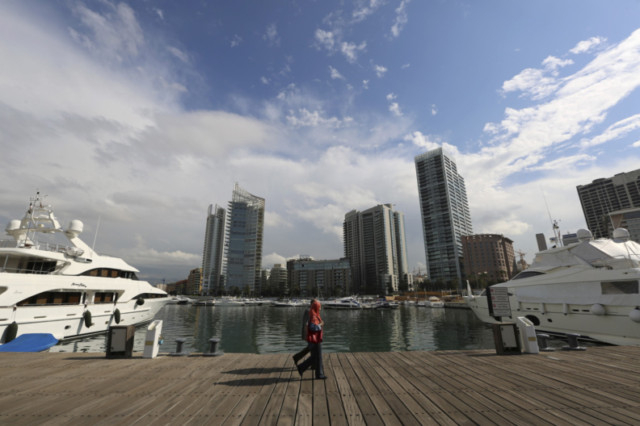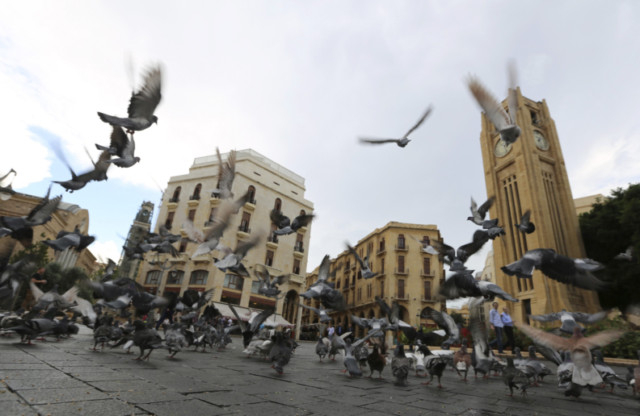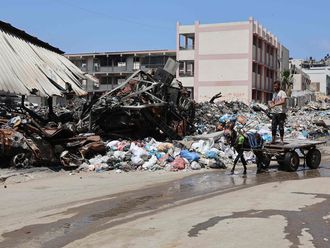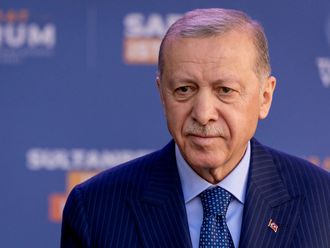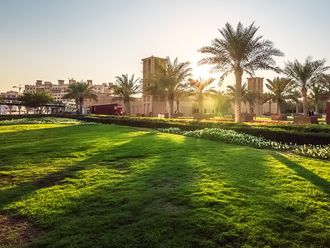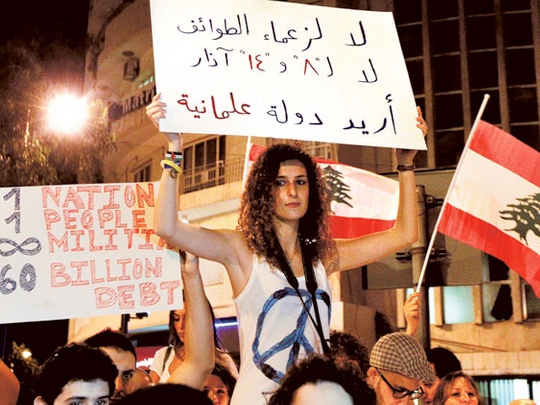
Beirut: Luxury yachts line the glitzy seafront marina of Beirut’s Zaytouneh Bay where owners would sip champagne at sunset before stepping out for dinner - spoilt for choice between going Italian at Signor Sassi or French at Cro Magnon.
Across the street, the Whisky Mist night club at the Intercontinental Phoenicia Hotel would normally be swinging with Beiruti night clubbers. The real estate market, meanwhile, defies not just the laws of economics but geopolitical gravity. “How people can ask for $100,000 in rent when the country is on the edge of the abyss I find extraordinary,” said Michael Karam, a wine writer.
Lebanon would seem to have it all: a cosmopolitan society, beach resorts, mountains, friendly weather, good food and wine, and buzzing bars.
The party capital of the Arab world, Beirut is a freewheeling city where Arabs, expatriates and Lebanese emigres fly in to enjoy its luxury hotels. But under the veneer of modernity lie sectarian demons coiled to strike.
The car-bomb assassination last Friday of intelligence chief Wissam Al Hassan - an attack almost universally blamed on Syria and its local allies - brought the merry-go-round to a juddering halt.
Gunmen and protesters filled the streets, reflecting the antagonisms fuelling the conflict in next-door Syria and reviving memories of the sectarian hatreds that sunk Lebanon into its 1975-90 civil war, a conflict whose wounds have far from healed.
It is not just the sectarian poison - reflecting the regional struggle between Sunni and Shiites and, in Lebanon, the Christians split into alliances with both sides - but the shocking social contrasts that lie beneath the surface.
Not far from the glamour of the Beirut seafront lie shanty towns where destitute people fight for daily survival.
Two apartments in the gleaming skyscrapers overlooking Zaytouneh Bay sold only a few months ago for $18 million and $14 million. Apartments for rent were non-negotiable a month ago at a price of $100,000. Real estate agents claimed demand was high from rich Syrians fleeing the conflict at home, but now they admit they may not see such fat deals for some time.
“There are many Lebanons. We live in a true disconnect. This place is on a respirator. We live in a bubble within the bubble,” said Maria, 47, an interior designer who left Lebanon aged 9 and returned after 17 years abroad.
Even before last Friday’s blast, the spillover from Syria had started to have a knock-on effect in Lebanon.
Security was deteriorating as the rule of law crumbled. Bank robberies and kidnappings for ransom picked up and sectarian rumblings between Sunni and Shiites heightened as Lebanon’s main Muslim factions lined up with the opposing sides of the Syrian conflict.
Tourists who come for the Roman ruins stayed away this year, leaving frightened Lebanese to contemplate another round of sectarian strife.
The Christian-Muslim bigotry that triggered Lebanon’s own war is now buried within the overarching Sunni-Shiite struggle convulsing the region. The battle lines in Syria are drawn between the Shiite Alawite minority underpinning Bashar Al Assad and the rebellious Sunni majority, with minorities such as Christians and Druze caught in the crossfire.
Like other Lebanese, Karam has had enough. He will leave the country in which he married, had children and lived through three wars and a popular revolution.
“What prompted me to say this summer that it is time to go is the fact that Syria is in crisis. I am not for one second one of those people who say the Assad regime has to stay, No, but I think while Syria is in crisis Lebanon will be in a more dangerous situation,” he said.
GREAT CITY
Karam moved to Lebanon from London in 1992, two years after the war ended and the rebuilding of Beirut by former premier Rafik Hariri, a billionaire construction tycoon, started.
The first tremor under this resurrected Beirut shook the city in 2005, when Hariri was killed by a massive bomb. The attack was blamed on Syria and its Lebanese ally Hezbollah.
“Now my kids are 15 and 14. They want to go out and I don’t want them going out because I don’t want to worry every time they go out,” said Karam.
Maria, the interior designer, has already sent her two sons to school abroad. A Sunni with Shiite kids, she said sectarianism was embedded in Lebanese life and she did not want her children to subscribe to this culture.
“For me it is a personal choice but for them they have no place in this society. They don’t subscribe to the grammar of this place,” said Maria.
Beirutis are in a state of shock at the renewed violence, which is reviving memories of the civil war which claimed more than 150,000 lives.
RESILIENT CITY
Like many others Karam believes that unless the Lebanese rebuild a state not based on religion, tackle the security vacuum and revive the comatose economy, the country will lurch from periods of growth and prosperity to periods of instability.
Syria is the epicentre at the moment. Sectarian hostility is on the rise across the region. It began in Iraq after the fall of Saddam Hussain, a Sunni, and the takeover of power by majority Shiites. This shift in the balance of power reinforced the influence of Shiite Iran and revived historic tensions in the region.
That ugly side was on display last week after the car bomb that killed Hassan, a Sunni opposed to the Syrian leadership.
Sectarian anger boiled over, with protesters chanting slogans insulting Hezbollah leader Sayyed Hassan Nasrallah. “The blood of Sunnis is boiling,” they said.
Yet despite all its troubles, there is a resilience to Beirutis, whose city could scarcely have survived without it.
“Beirut has tremendous energy, it is a city that picks itself up in few hours. It is like a very ugly woman with lots of charm and lots of character, extremely imperfect,” said Maria.
“As imperfect as it is with all these people trying to live together, for better or for worse, they attempt to,” she said.
Free market economy
Lebanon has a free-market economy and a strong laissez-faire commercial tradition. The government does not restrict foreign investment; however, the investment climate suffers from red tape, corruption, arbitrary licensing decisions, complex customs procedures, high taxes, tariffs, and fees, archaic legislation, and weak intellectual property rights. The Lebanese economy is service-oriented; main growth sectors include banking and tourism.
The 1975-90 civil war seriously damaged Lebanon’s economic infrastructure, cut national output by half, and derailed Lebanon’s position as a Middle Eastern entrepot and banking hub.
Following the civil war Lebanon rebuilt much of its war-torn physical and financial infrastructure by borrowing heavily - mostly from domestic banks - saddling the government with a huge debt burden. Pledges of economic and financial reforms made at separate international donor conferences during the 2000s have mostly gone unfulfilled, including those made during the Paris III Donor Conference in 2007 following the July 2006 war.
The collapse of the government in early 2011 over its backing of the Special Tribunal for Lebanon and unrest in neighboring Syria slowed economic growth to 1.5% after four years of 8% average growth. In September 2011 the Cabinet endorsed a bill that would provide $1.2 billion in funding to improve Lebanon’s downtrodden electricity sector, but fiscal limitations will test the government’s ability to invest in other areas, such as water.
CIA The World Factbook
Nationality:
Lebanese (singular and plural)
Ethnic groups:
Arab 95%, Armenian 4%, other 1%
note:many Christian Lebanese do not identify themselves as Arab but rather as descendents of the ancient Canaanites and prefer to be called Phoenicians
Languages:
Arabic (official), French, English, Armenian
Religions:
Muslim 59.7% (Shiite, Sunni, Druze, Ismailite, Alawite or Nusayri), Christian 39% (Maronite Catholic, Greek Orthodox, Melkite Catholic, Armenian Orthodox, Syrian Catholic, Armenian Catholic, Syrian Orthodox, Roman Catholic, Chaldean, Assyrian, Coptic, Protestant), other 1.3%


